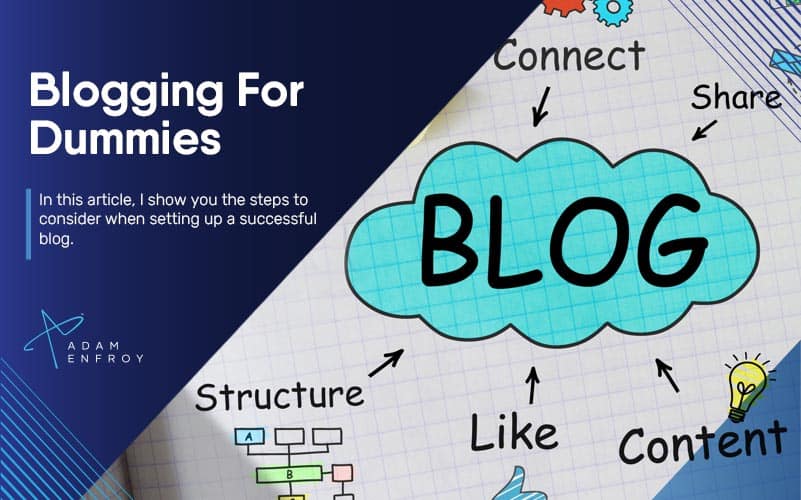The Ultimate List of Artificial Intelligence Statistics for 2024
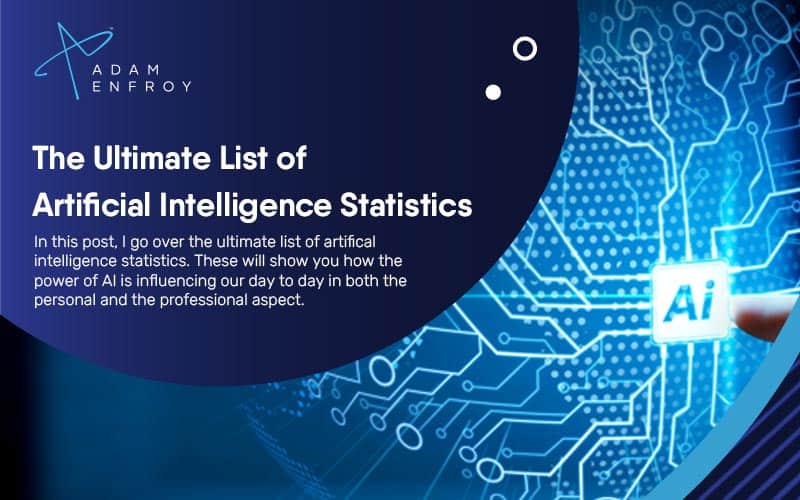
Artificial intelligence is shaping the present as we know it, giving us a very exciting future to look forward to.
Futurists predict that artificial intelligence (AI) will play a pivotal role in providing solutions to our most significant global challenges, including eradicating disease and mitigating the impacts of climate change.
In addition, AI has various uses in business.
For starters, AI investing software can predict which stocks will give the best returns.
Artificial intelligence recruitment software can sort through and categorize CVs and resumes, making the hiring process run more smoothly.
In a market that is several years away from reaching saturation, it’s time to prepare for the coming AI revolution.
In this article, I will go through the latest list of artificial intelligence statistics and break down the numbers for the global market, sales, and marketing-related stats, and even the use of AI for voice-related queries.
If you want to understand the AI market, where it’s heading in the future, and how Big Data is driving the industry forward, these statistics will help you immensely.
Let’s get right into it.
Statistics About The Global AI Market
1. By 2030, AI will have contributed $15.7 trillion to the worldwide economy.
(World Economic Forum)
AI will help the global economy grow significantly over the coming years.
According to the World Economic Forum, almost $16 trillion will be added to the global economy by 2030, thanks to artificial intelligence.
With various exciting AI advancements and technologies, such as virtual assistants and autonomous cars, it’s unsurprising to see why AI will increase our GDP.
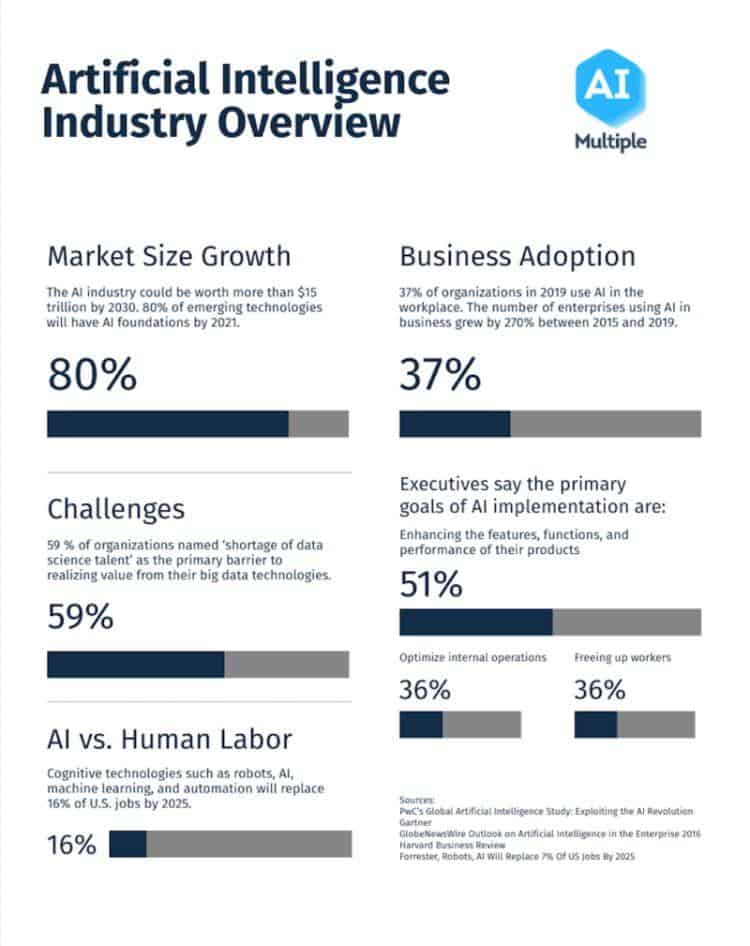
Image Credit: AImultiple.com
2. AI’s CAGR (compound annual growth rate) between 2020 and 2027 is estimated to be 33.2%.
(Fortune Business Insights)
AI will be one of the most significant growth sectors in the next few years.
According to Fortune Business Insights, between 2020 and 2027, AI is set to increase year after year at a rate of 33.2 percent.
The future is bright for AI, and those willing to jump on the bandwagon now will benefit from this trend in the coming years.
This also means that investors that get in early will likely see the most significant returns.
3. North America will have the largest AI market share.
(Fortune Business Insights)
It might not come as a surprise to hear that North America will have the largest share in the AI market.
Several factors contribute to this, including government funding and research centered around AI conducted in universities.
In addition, North America has a booming tech industry, which attracts some of the best minds in the AI research field.
Statistics Related To AI Digital Voice Assistants
4. AI Voice assistants will be used by 55% of users with a devices that are hands-free.
(Pew Research Center)
Voice search and assistance are becoming more commonplace.
In a study published by the Pew Research Center, it was found that 55 percent of participants use AI when they are out and about and can’t necessarily use their hands to make choices with their smartphones.
With the proliferation of smart homes, virtual reality, and augmented reality just around the corner, voice assistance is set to become even more commonplace in our daily lives.
5. Voice assistants will be used by 26% of users to connect remotely with various systems.
(Pew Research Center)
With various integrations found in the workplace, home, and living environments, it’s unsurprising to see how many users use voice assistants.
Connecting with other systems remotely using your voice means that various systems can ‘play’ together nicely and help reduce bottlenecks or slowdowns in multiple processes.
6. 75% of IT employees in senior positions say that network security will be better thanks to them adopting AI voice assistance technology.
(Statista)
Voice assistance will also help security become more accessible and more efficient.
AI will help boost network security thanks to improved threat detection and reduction, further increasing the overall level of security.
With more secure systems and networks, businesses will be more likely to trust such devices and thus make even greater use of their AI voice assistants.
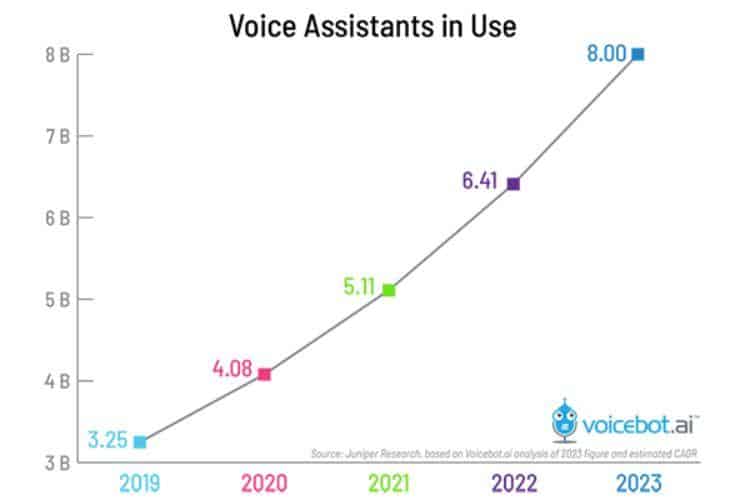
Image credit: Voicebot.ai
Productivity in AI Use
7. 52% – the number of executives that state productivity has increased when using AI.
(PwC, 2021)
Productivity is a common keyword associated with AI, and it’s easy to see why.
Fifty-two percent of executives surveyed by PwC believe that their companies have been boosted in productivity thanks to AI tools.
Various business aspects can be improved through AI.
These include personal assistants that can give you the right information at the right time, chatbots that make communication more efficient, invoicing systems that can streamline business operations, as well as anything in between.
8. AI has allowed a quarter of participating business executives to fully enabled their business processes.
(PwC, 2021)
Getting 100% out of a business process is not easy. However, with the integration of AI, it’s becoming more and more common.
Twenty-five percent of executives believe that their business processes have been fully enabled thanks to this technology.
This allows such businesses to keep getting more robust in a competitive market and continue to deliver better products or services to their customers.
9. 54% of company executives deem AI to play a significant role in improving decision-making.
(PwC, 2021)
AI can also help with decision-making, considering aspects that humans might not think about or even come up with consequences that might not be otherwise foreseen.
More than half of the surveyed participants said that AI was crucial in helping to quickly reach conclusions and adapt to circumstances that might affect their particular industry.
Statistics Related to AI in Sales
10. When it comes to sales strategies, AI has helped various enterprises earn at least 20% EBIT (Earnings Before Interest and Taxes).
(McKinsey & Company)
EBIT is a key indicator used by enterprises to measure the growth of their business.
McKinsey & Company’s study suggested that AI was involved in a minimum of 20 percent EBIT, which is a good omen for businesses in the future.
It also suggests that AI will positively impact EBIT in both the short and long term, thanks to increased productivity and speed.
11. Various sales (and even marketing) departments stated that in 79% of the case, using AI adoption helped in better revenue.
(McKinsey & Company)
Almost 8 out of 10 sales departments were found to have been positively affected by AI.
Increasing business revenue in the long term is a good sign for these businesses and, in turn, their customers too.
When it comes to sales, AI can help business owners optimize internal business operations.
This can include how they handle their sales process and then help with targeting the correct audience more efficiently.
12. When analyzing customer segmentation and customer service, AI in sales is an advantage that is being more commonly used.
(McKinsey & Company)
Getting ahead in sales can give businesses an advantage over their competitors in various ways.
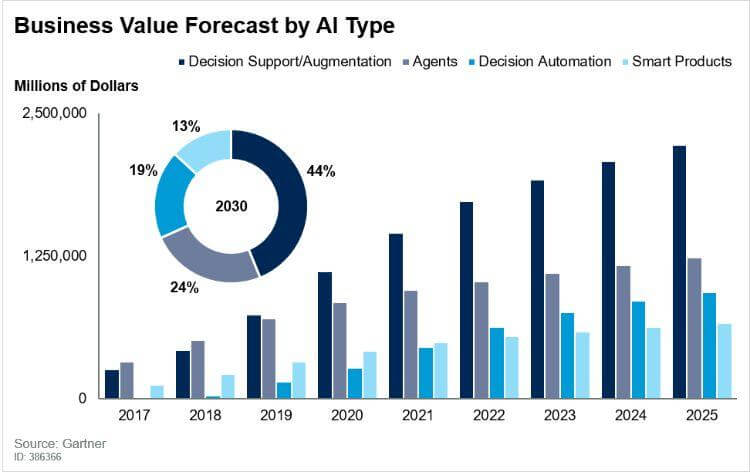
Image credit: Gartner.com
Segmenting customers and providing better customer service are two critical aspects of AI adoption.
The McKinsey & Company study suggests that such benefits can be enjoyed by most companies making use of AI.
Statistics Related To AI in Marketing
13. 64% of those surveyed stated that particular marketing-related activities are automated using AI in various large organizations they’re involved in.
(Adobe)
Similar to sales, marketing is another area that can benefit from AI.
Adobe’s study suggests that more than half of the surveyed participants saw an increase in performance thanks to this technology.
This included improved ability to reach new customers and target ads directly to them based on specific preferences.
14. In marketing, the use of AI in large organizations accounts for 29% of all campaigns and experiences.
(Adobe)
Large organizations are well on their way to adopting AI in their marketing departments.
Many marketers, especially large enterprises, have already started using AI to help them with different activities such as driving marketing campaigns and providing top-notch experiences for their customers or potential buyers.
With 29% of the responses saying that AI is crucial in this regard, marketers will definitely continue using this advancing technology in the long term.
15. In terms of the previous stat, SMBs use AI to a much lesser degree to help them in their business – in fact, only 12% do.
(Adobe)
One issue that came up in this survey is that small and medium businesses don’t seem to prioritize AI (as much) when it comes to marketing.
Only 12 percent of participants from small and medium type businesses said that they were using AI to drive their campaigns and experiences.
If SMBs want to beat the more prominent players in the industry, this might be something that will have to change.
Why AI Technologies Are Becoming Crucial In Our Lives
Our day-to-day activities require both simple and sophisticated forms of automation.
We engage with various software solutions to complete our tasks, so the world around us can function correctly.
Artificial Intelligence algorithms are becoming an integral part of everyday life because they provide solutions that simplify actions without requiring human intervention.
As AI technologies evolve, more processes will become automated, which will maximize customer satisfaction while reducing operational costs.
The last decade has witnessed significant improvements in AI technologies due to deep learning capabilities.
Such capabilities attained by algorithms using neural networks make all of this a reality.
In fact, deep learning is a form of machine learning involving multiple layers between input and output nodes for modeling problems hierarchically.
This is something that the human brain does and as such, these models attempt to replicate the way we think.
These innovative advancements enable software agents to perform complex tasks in a way that is similar to humans.
AI In Our Business Lives
In business, various aspects can benefit from AI technologies. These include some of the following aspects.
Product And Service Optimization.
Using data analytics and predictive analytics, customer data platforms can discover patterns that lead to better products and services by recommending adequate customer solutions.
It is now possible to analyze customer feedback in real-time and generate product improvements faster than ever before.
More Effective Marketing Strategies.
Algorithms allow marketers to create more precise targeting by leveraging psychographic profiles based on social media information.
They can identify trends quickly, which enables them to launch new campaigns with minimal risk.
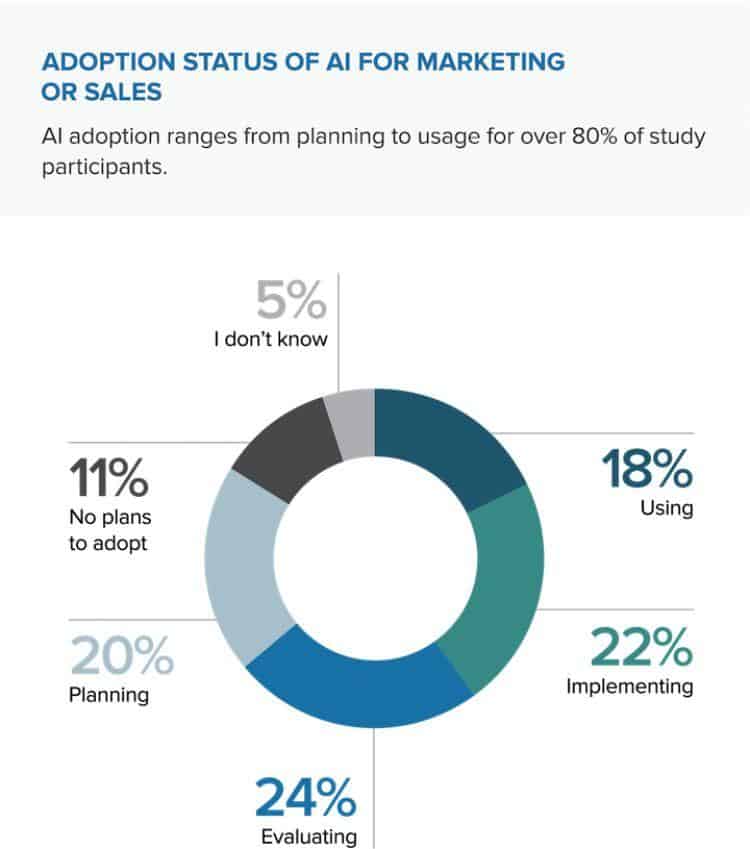
Image Credit: Komarketing.com
Customer Experience Management.
Through live chatbots and natural language processing (NLP), call center software and companies can improve their interactions with end-users through automated processes.
An AI strategy allows companies to analyze customers’ behavior to define what could improve the customer experience.
Customer service interactions that were only manually done before, now have the power of AI integration, which can provide a much higher level of customer satisfaction.
For example, chatbots can answer many frequently asked questions about a company’s products and services, reducing the length of conversations needed between customers and agents.
Increasing Revenue Through Effective Business Process Management.
Algorithms can collect data from different parts of a company’s environment, analyze it, and identify opportunities for improvement to increase operational efficiency.
This is particularly useful when trying to find hidden problems that could affect sales or other areas in the organization.
These areas can then be corrected before they turn critical.
Powering Better Business Performance Management And Decision making.
Algorithms can use data from different company departments such as sales, marketing, finance, and HR to provide an integrated picture of the company’s overall health.
This allows providers to make faster decisions, which are crucial in a volatile market environment where changes can significantly impact critical metrics.
Help Sales And Marketing Reach Their Potential
A well-defined AI strategy is one where a sales and marketing strategy is aligned with company objectives.
Such a strategy is used to obtain an advantage over competitors by increasing market share, especially in highly competitive industries.
Increasing Revenue Through Improved Lead Prioritization And Nurturing
Lead scoring has become a key metric for measuring sales effectiveness.
Machine learning algorithms can accurately assign scores based on detailed analysis of behavioral factors, engagement levels, demographics, and other factors, making them more reliable than manual scoring.
Algorithms can improve marketers’ ability to prioritize leads which reduces overall marketing cost as less effort is wasted on customers that are unlikely to buy.
The Importance Of Data Protection
While AI and machine learning help a ton in business, it’s important to remember that customer data is sacred.
Any company using data to make decisions must do it ethically and responsibly, ensuring they are transparent in their practices.
AI In Our Personal Lives
We can’t speak about the AI industry without considering the impact AI assistants such as Amazon’s Alexa and Google Assistant have made in our day-to-day lives.
These technologies allow us to control devices with our voices, creating a more natural interaction between us and the devices we frequently use.
Various platforms such as Netflix, Apple’s Siri, and Google Assistant all use AI to provide recommendations, while Pandora and Spotify use it to play personalized music.
These platforms have made day-to-day tasks easier and more enjoyable – all without requiring people to spend a lot of time learning how to use this new technology.
The Human-Technology Partnership
It is evident that AI systems are best used when they work in tandem with human intelligence; humans must adapt their current roles to ensure maximum performance.
It may not be enough for workers to simply learn about AI possibilities.
Instead, they should learn how to harness this opportunity and adapt as needed.
If not, many of their skills might become obsolete in the near future.
Consequently, education programs should incorporate training on new technologies, so future employees are prepared for whatever changes are happening.
Whether speaking about healthcare, AI startups, the supply chain industry, cybersecurity, or any other types of AI applications (in both personal and business), the future is bright.
As we continue to move forward, it will be interesting to see how technology changes our lives and helps us improve the way AI capabilities empower us.
AI solutions are also sought after with huge interest from big companies.
These include those such as Forrester, Forbes, Gartner, IBM, and many others.
With such big names interested in the development of AI, the next few years are set to be crucial in the history of artificial intelligence with its large number of benefits for every industry.
Wrap Up.
The interesting AI statistics show you how artificial intelligence gives business leaders a competitive advantage that can guide their organizations towards a higher level of customer satisfaction.
It also helps them comply with various AI-related governmental requirements and gives customers a great deal of convenience in performing their daily tasks.
Data scientists are currently seeing a digital transformation in artificial intelligence marketing, with the number of use cases for AI usage on the rise.
The number of AI-related jobs is also expected to become massive over the next few years, which keeps increasing the market size and profitability of the artificial intelligence market.
What do you think about AI? Have you incorporated it into your business? Let me know your thoughts in the comments below.
Further reading on AdamEnfroy.com: Now that you know where the artificial intelligence market is headed, check out this list of the best machine learning software to see if any of these are the right fit for you and your business.
Also, if you want to learn how AI currently impacts the writing industry, here is my post on the best AI writing software to see what the future holds for writers.




